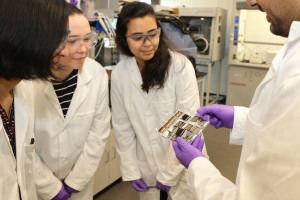The U.S. is undergoing an historic transition of its energy system in order to decarbonize and help mitigate the worst effects of global climate change. Optimistically, the electrical system will become largely based on renewable and sustainable sources in the near future, and major energy consumption sectors of transportation, residential and commercial buildings, and industrial production will electrify and approach net-zero carbon emissions around 2050. These changes constitute complex transitions in economic, political, and regulatory alignments along with technological innovation and continuing scientific advances. There is an urgent and growing need for technically and scientifically literate practitioners who can join cross-disciplinary teams working in both the public and private sectors to craft transition pathways and help deploy sustainable energy systems.
The Sc.M. in Sustainable Energy challenges students to integrate knowledge across a wide range of science, engineering, policy, and business topics, develop a focused expertise in one aspect of sustainable energy systems, and prepare to enter or re-enter a career path directly impacting the progress of electrification and decarbonization.
The objectives of the Brown University sustainable energy master’s degree program are to produce graduates who will:
- Develop an integrated coherent understanding of energy systems that unites perspectives from climate science, engineering and technology, policy, economics, and sustainability.
- Engage with energy system analysis, simulation, modeling, and planning at a level consistent with current practice in government, industry, and advocacy.
- Achieve or deepen disciplinary expertise in one focus area relevant to the decarbonization process.
